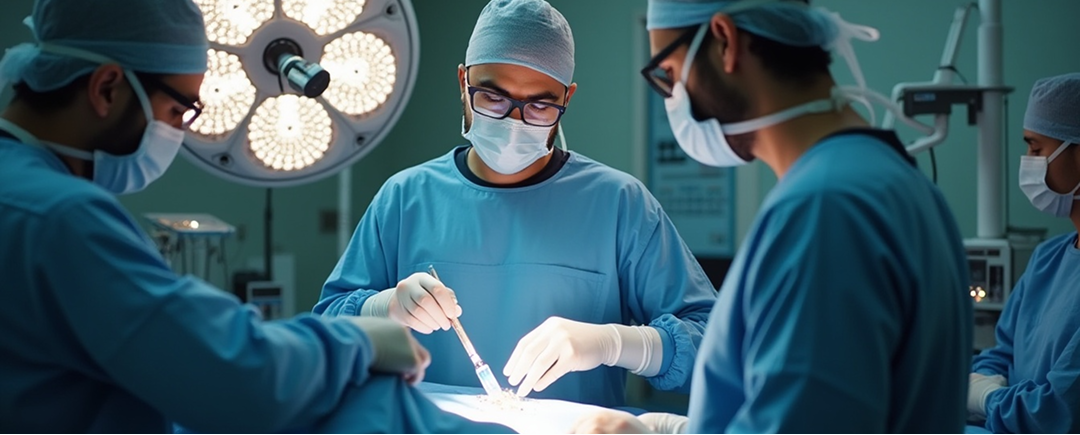
Gastro-intestinal & Bariatric Surgery
Minimally Invasive & Robotic GI Surgery for Esophagus, Stomach, Liver, Pancreas, Bile Duct, Colon & Rectum.
Highly advanced precision techniques, enhanced recovery, and multidisciplinary collaboration for optimal digestive-health outcomes.
The Gastrointestinal Surgery Service provides comprehensive surgical management of benign and malignant diseases of the digestive tract using the most advanced surgical technology, including the da Vinci Robot. We routinely perform minimally invasive surgery on the upper GI, colorectal, and hepatopancreatobiliary organs, utilizing both robotic and laparoscopic techniques. Our enhanced recovery pathways (ERAS) shorten hospital stays and improve outcomes. We are unique in the UAE for performing Totally Robotic Whipple surgery and Esophagectomy.
1
GI surgeon specializing in colorectal, HPB, foregut, minimally invasive surgery, and surgical endoscopy215
GI surgeries performed in 2024, with 70% being robotic/laparoscopic3
median hospital stay (in days) after colectomy.~0%
Anastomotic leak rate post-colorectal resection (well below the global benchmark of <3%).Common Conditions & Subspecialty Clinics.
- Ovarian cyst evaluation and management
- Hiatal hernia
- Achalasia of cardia
- Gastric and esophageal cancer
- Gastrointestinal stromal tumors (GIST)
- Colon and rectal cancer
- Inflammatory bowel disease (IBD) strictures
- Diverticulitis
- Rectal prolapse
- Complex perianal fistula
- Pelvic floor dysfunction
- Colorectal liver metastases
- Hepatocellular carcinoma (HCC)
- Cholangiocarcinoma
- Pancreatic and biliary cancer
- Chronic pancreatitis
- Bile-duct injuries and strictures
- Intragastric Balloon insertion and removal
- Endoscopic Sleeve Gastroplasty (ESG) for obesity
- TORe
- Hemorrhoids
- Anal fissures
- Anorectal fistula
- Hernias (ventral, inguinal, incisional, umbilical)
Procedures & Treatments.
Robotic/Laparoscopic Abdominal Wall Hernia Repair (primary and recurrent)
Gastric Balloon Insertion
Robotic/Laparoscopic Revision Bariatric Surgery
Robotic/Laparoscopic Sleeve Gastrectomy
Roux-en-Y Gastric Bypass / Mini Gastric Bypass (Bariatric Surgery)
Robotic/Laparoscopic Roux-en-Y bile duct reconstruction
Minimally invasive trans-rectal surgery (TAMIS)
Laparoscopic/Robotic Splenectomy
Robotic/Laparoscopic Adrenalectomy
Laparoscopic/Robotic Whipple (Pancreaticoduodenectomy) and distal pancreatectomy with spleen preservation
Laparoscopic Heller Myotomy & Nissen Fundoplication
Robotic/Laparoscopic Gastrectomy
Robotic/Laparoscopic Pancreatic surgery
Robotic/Laparoscopic Right & Left Colectomy
Rectal surgery, Low-Anterior Resection, TaTME, APR
Robotic/Laparoscopic Esophagectomy (two-stage/three-stage)
Redo Abdominal Wall Reconstruction with biologic mesh & component-separation technique
Cytoreductive Surgery with HIPEC for peritoneal carcinomatosis (with Oncology)
Bile-Duct Resection with Roux-en-Y Reconstruction
On-table perfusion assessment using ICG fluorescence
ERAS protocols with carbohydrate loading, multimodal analgesia, early feeding
Care Pathway & Coordination.
Surgical Clinic Evaluation
History, imaging review, and multidisciplinary tumor board (if oncologic).
Pre-habilitation & Optimization
Nutrition, smoking cessation, exercise program, anesthetic assessment.
Definitive Procedure
Minimally invasive, robotic, or open surgery with intra-operative imaging adjuncts.
Enhanced Recovery
Early oral intake, ambulation POD 0–1. Discharge criteria met POD 1–4 in most cases.
Surveillance & Survivorship
CT/MRI schedule, nutritional counseling, and stoma care if applicable.
Technology & Facilities.
da Vinci Xi Robotic Platforms
4K/3D Laparoscopy Towers
Image-Guided Sinus Navigation
< 2 mm accuracy reduces orbital/skull-base injury
GI Motility & Physiology Lab
High-resolution manometry, pH-impedance, SmartPill™
FibroScan® & 3-D Liver Elastography
Non-invasive fibrosis staging
Robotic Surgery Suite (da Vinci Xi)
For foregut and colorectal resections when surgical management is required

